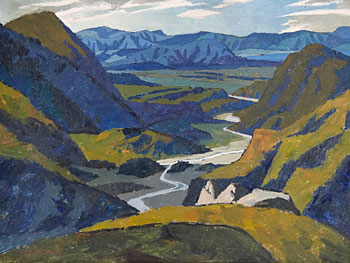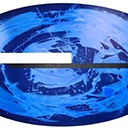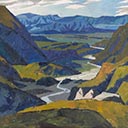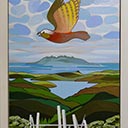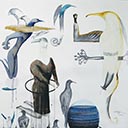South Westland, 1959
46 x 61 cm
PROVENANCE
Estate of R G Glubb, Christchurch
EXHIBITED
Russell Clark 1905 - 1966 A Retrospective Exhibition Robert McDougall Art Gallery, Christchurch 1975 Catalogue no. 47. Original exhibition label affixed verso
The eloquence of painting is that it wordlessly pays homage, serenades a lover or stands in awe. Wordlessly, yet expressively: with a thousand brushstrokes; the gestures of a loaded brush; the demeanour of composition; and with chromatic intensity. This painting says 'I have no words.' What words could be substituted? This painting is the expression of a moment where others of us might stand on the hilltop and simply say "Wow!!" - Yeah, nah…. Not adequate.
Christchurch born Clark began taking art classes as a sixteen year old at the Canterbury College of Art and by the age of twenty was teaching there part time. Though he began exhibiting and receiving mural commissions almost immediately, he also needed regular income and turned to commercial art through the 1930s in a restless succession of jobs in Christchurch, Dunedin and Wellington. The Second World War seemed to offer even wider horizons for the confident young artist and so he offered his services as war artist to then Prime Minister, Peter Fraser in 1942 and subsequently served with the 3rd New Zealand Division in the Pacific.
After his war service, he returned to Wellington and his career in advertising; but he found this return to a former life unsatisfactory and quit Wellington and advertising for a job at the Canterbury School of Art and a life in Christchurch where he spent the remainder of his career. South Westland by Russell Clark is painted a good dozen years into this South Island life and reveals the depth of his confidence and the vibrancy of his joy in painting. During the late 1940s he abandoned atmospheric effects in his paintings for broad planes and bolder colour and the 1950s became his most experimental and productive phase as an artist. This painting, completed in 1959, comes at the pinnacle of his easel painting; and just at the moment before painting became secondary to sculpture for him; and it was in sculpture, that Clark became one of the most important pioneers of Modern public art in New Zealand. We see the move and the later achievements pre-figured in South Westland. For the treatment of the foreground clearly indicates his sculptural concerns and the lessons he was absorbing, even at this mature stage in his career, from the likes of Barbara Hepworth and Henry Moore with its bold, almost impasto facets, angular planes and strong chiaroscuro. It is an unusual case in which we can describe this work as coming from the peak of the artist's painting career while also being transitional in relation to his sculptural career.
Rob Garrett

